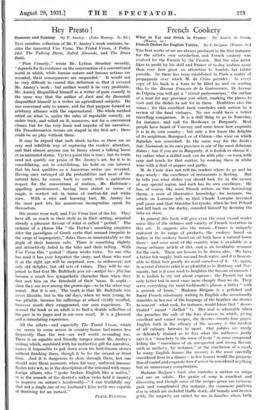Hey Presto !
Humour and Fantasy. By F. Anstey. (John Murray. 8s. 6(1.) 'Pius omnibus collection of Mr. F. Anstey's work contains, be- sides the immortal Vice Versa, The Tinted Venus, A Fallen Idol, The Talking Horse, Salted Almonds, and The Brass Baffle.
"Pure Comedy," wrote Mr. Lytton Strachey recently, "depends for its existence on the construction of a conventional world in which, while human nature and human actions are revealed, their consequences are suspended." It would not be very difficult to emend this definition so that it covered Mr. Anstey's work : but neither would it be very profitable. Mr. Anstey disqualified himself as a writer of pure comedy in the same way that the author of Jack and the Beanstalk disqualified himself as a writer on agricultural subjects. He was concerned only to amuse, and for that purpose formed an arbitrary alliance with the supernatural. His whole method relied on what is, under the rules of reputable comedy, an unfair trick, and relied on it, moreover, not for a convenient climax but for the very basis and impulse of his narrative. His Transformation Scenes are staged in the first act ; there could be no play without them.
It may be argued that such shock tactics as these are an easy and infallible way of capturing the readers' attention, and that almost anyone can be funny about a talking horse or an animated statue. Up to a point this is true; but its truth need not qualify our praise of Mr. Anstey's art, for it is in consolidating, not in establishing, his hold on our interest that his best qualities as a humorous writer are revealed. Having once outraged all the probabilities and most of the natural laws, he comes back to earth. with a meticulous respect for the conventions of realism. Mr. BUltitude's appalling predicament, having been stated in terms of magic, is worked out in terms of mutton-fat and white mice. With a nice and knowing tact, Mr. Anstey for the most part lets his monstrous incongruities speak for themselves.
His stories *ear well, and Vice Versa best of the lot. They have all, as much in their style as in their setting, acquired already a pleasant flavour of what is called "period." The cadence of a phrase like "the Doctor's searching enquiries after the paradigms of Greek verbs that seemed irregular to the verge of impropriety," dates them as unmistakably as the jingle of their hansom cabs. There is something slightly and attractively faded in the tales and their telling. With Vice Versa this " period " charm works twice. No one who has read it has ever forgotten the story, and those who read it at the right age will be surprised, now, to rediscover, not only old delights, but old sets of values. They will be sur- prised to find that Mr. Bultitude pire (et—malgre (ui—flls) has become a much less sympathetic character than when they first met him on the threshold of their 'teens. It ought — since they are now among the grown-ups—to be the other way round. But it is not. The truth is that Mr. Bultitude was never likeable, but in the old days, when we were young, he was pitiable, because his sufferings at school vividly recalled, however much they exaggerated, our own experience. To re-read the book as an adult is to find a double reflection of the past in its pages and in our own mind. It is a pleasant and a stimulating experience.
All the others—and especially The Tinted Venus, which one seems to come across in country-house bed-rooms less frequently than the rest--are well worth re-reading too. There is an equable and friendly temper about Mr. Anstey's writing which, combined with his instinctive gift for narrative, makes it impossible to put down even his best-known stories without finishing them, though it be for the second or third time. And it is dangerous to skim through them, lest one should miss those moments when his easy, unforced humour flashes into wit, as in the description of the criminal with many foreign aliases who "spoke broken English like a native," or in the remark of the dentist's widow (who held it impiety to improve on nature's handiwork)—" I can truthfully say that not a single one of my husband's false teeth was capable of deceiving for an instant."
PETEll FLEMING.


























 Previous page
Previous page